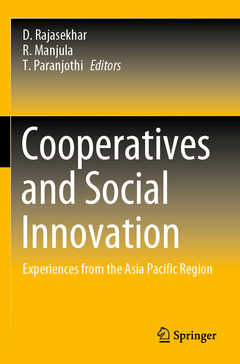Description
Cooperatives and Social Innovation, 1st ed. 2020
Experiences from the Asia Pacific Region
Coordinators: Rajasekhar D., Manjula R., Paranjothi T.
Language: English
Subjects for Cooperatives and Social Innovation:
Publication date: 10-2021
293 p. · 15.5x23.5 cm · Paperback
Publication date: 10-2020
293 p. · 15.5x23.5 cm · Hardback
Description
/li>Contents
/li>Biography
/li>Comment
/li>
This book discusses social innovations by cooperatives from the Asia and Pacific region. Social innovations emerge when the state and market in developing countries find it difficult to solve problems such as poverty, hunger, ill health, poor education systems, inadequate drinking water and poor sanitation. These countries also face barriers to economic growth such as climate change, poor governance, unequal opportunities and social exclusion. This volume therefore addresses the following questions. What are the distinctive features of social innovations by cooperatives? How social innovations bring in changes in the process and outcome of development?
After presenting theories of social innovation and a critical review of cooperatives and social innovation, the book presents 15 chapters on social innovations by cooperatives in the Asia Pacific region. These social innovations are related to health insurance, community based tourism, disaster response, climate smart agriculture, use of social media for youth empowerment, training for the emergence of second-line leaders in cooperatives, social inclusion through innovative finance, profitable marketing of organic produce to strengthen economic status of small farmers, digital auction and value addition for income security of farmer members, collaboration between cooperative members and workers for the mutual benefit, worker cooperatives, women leadership and participation, building union-cooperative partnership in finance and rating of cooperatives to promote transparency and accountability. A chapter on innovative services of cooperatives during the time of Covid19 is also included.
This volume will be quite significant for co-operators, researchers, teachers, practitioners and policy-makers at the global level. The theme is relevant for international development community and national cooperatives with concern for their communities, which is the seventh cooperative principleof International Cooperative Alliance and the Sustainable Development Goal of the UN.Dr. D. Rajasekhar is HAG Professor in Economics at the Centre for Decentralisation and Development (CDD), Institute for Social and Economic Change (ISEC), Bengaluru. He obtained Ph.D. and M.Phil from the Jawaharlal Nehru University, New Delhi (through Centre for Development Studies, Trivandrum). He was Visiting Scholar at the Universities of Oxford, Melbourne, Hitotsubashi, Sussex and at the Centre for Development Research, Copenhagen. He worked extensively on decentralisation, social protection and microfinance, and served in policy bodies constituted by the government. He has published 26 books/ monographs and 86 articles in national and international journals and as chapters. His recent paper (co-authored) on ‘Motivating Knowledge Agents: Can Incentive Pay Overcome Social Distance?’ is published in The Economic Journal. His paper on ‘Collusion, Co-option and Capture: Social Accountability and Social Audits in Karnataka, India’ published in Oxford Development Studies was awarded the Sanjaya Lall Prize for its contribution to the development studies. He is currently collaborating with researchers from the London School of Economics, and the universities of Bristol, Melbourne, Tsuda and Hitotsubashi in research relating to decentralisation and poverty reduction, delivery of public services and social protection. His recent books are "Decentralised Governance, Development Programmes and Elite Capture" (Springer: 2018) and "Decentralization, Cooperatives and Rural Development".
Dr. R. Manjula holds a PhD in economics and is working as Assistant Professor at CDD, ISEC, Bengaluru. She was an Academic Visitor at the Department of Economics, University of Oxford, UK. She has co-authored books and research papers (in national and international journals and as chapters). ‘Motivating Knowledge Agents: Can Incentive Pay Overcome Social Distance?’ is the recent co-authored paper published in T




